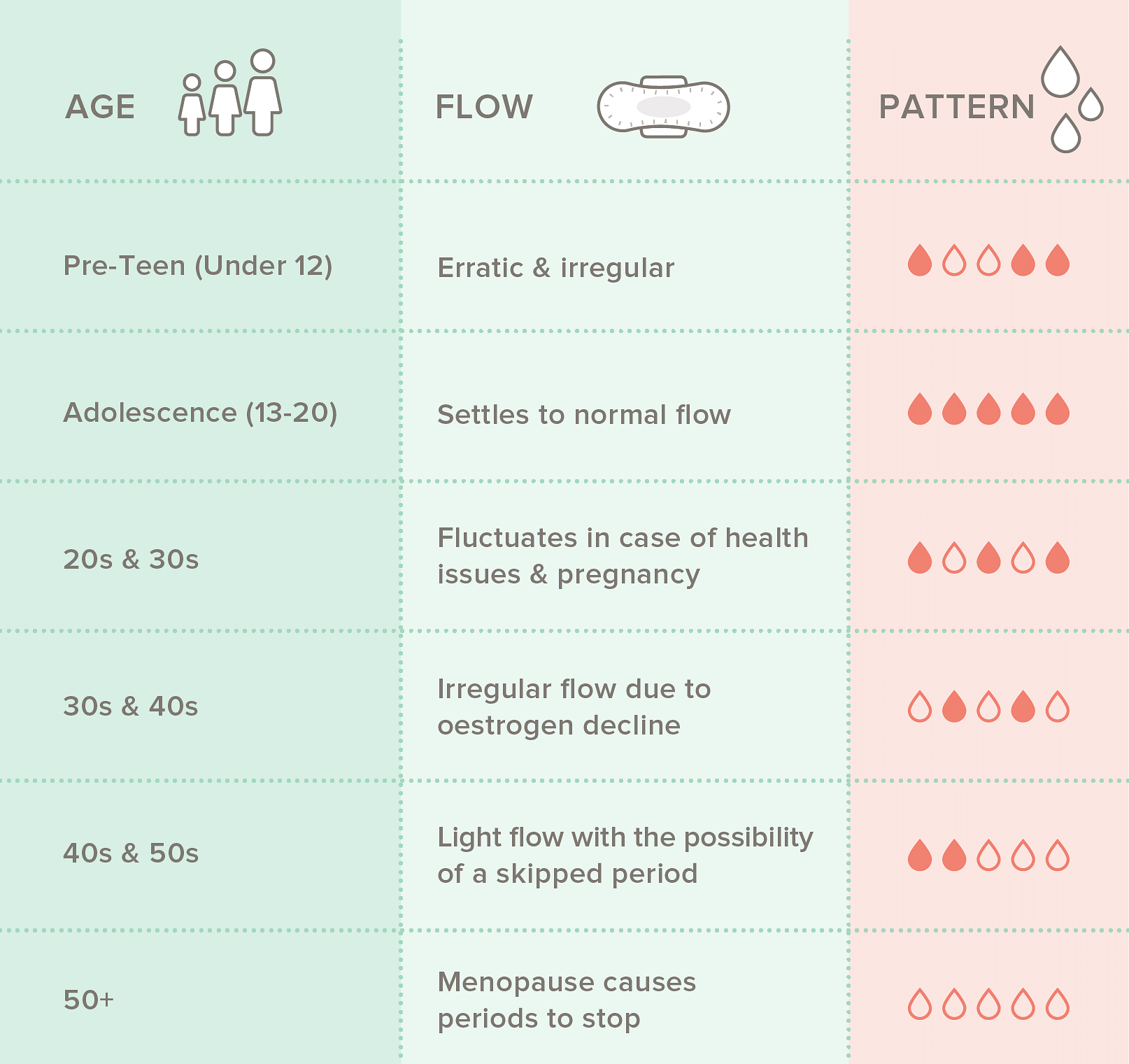The regular period of menstrual bleeding can vary between 3-7 days and the range of a period cycle can last between 21-35 days for a woman with no medical complications. A period or menstruation occurs due to the sexual hormones and their interaction with the other endocrine hormones of the body such as Thyroid, Prolactin & Insulin. The fine-tuning between these hormones can affect not just your period flow but also other aspects of your life when you reach a certain age, making you experience a fluctuation between heavy period flow to light period flow.
To understand this better, let’s start from the beginning of the woman’s life when the first period or menarche happens. This usually occurs between 9-12 years of age, during adolescence.
Periods from adolescence to adulthood
The sexual hormones regulating glands are controlled by Hypo-Thalamo-Pituitary Axis (HPA, the central mechanism in the brain). The maturity of HPA is achieved by 18-20 years of age, i.e. at adulthood.
From menarche to this duration, period flow can be erratic, heavy, and prolonged. Menstrual cycles can be irregular and unpredictable.
Weight gain can happen during this time due to unhealthy eating habits, lack of exercise due to abandonment of sports, concentrating on academics, and stress. This can have an impact on the periods.
Periods between the 20s to 30s
This age is important as sexual activity increases, pregnancy could occur, and women’s health-related problems can start appearing. The use of contraceptive pills and emergency pills can give rise to irregular periods or light period flow.
Childbirth leads to significant weight gain post pregnancy. While breastfeeding helps with weight reduction, lactational amenorrhea (not getting periods during breastfeeding) is common and can last between 4-9 months. Your period flow can decrease in quantity and days post-childbirth. This may be a normal instance for many women.
Periods between the 30s to 40s
The oestrogen hormone is released from the fat tissue, which becomes excess and causes hormonal imbalance. This can trigger Polycystic Ovarian Syndrome (PCOS) and overgrowth of the lining of the womb or hyperplasia. The scanty to light period flow with skipping of periods are PCOS symptoms while a heavy period flow can occur in hyperplasia of the uterus.
Uterine fibroids, ovarian cysts, and endometriosis are common gynecological health problems for women in this age group, giving rise to drastic changes in the normal pattern of the menstrual calendar, and flow, with or without pain.
Periods between the 40s-50s
The ovarian function starts declining at this age. It’s normal to skip one or two periods in a year, and your period flow can decrease significantly and last for 2-3 days. Perimenopause starts typically around 45 years of age, making your period unpredictable. This can continue till you reach menopause. The average occuranance of menopause for women is between the ages of 50-51 years when your period stops completely for a year.
Periods after the 50s
Very few women continue to have period flow after 51 years of age (only 15-20% of the entire population). They have symptoms of menopause with irregular periods and light period flow.
Any bleeding after menopause, even spotting, should be taken seriously. It needs to be investigated by the gynaecologist to detect the source of bleeding as it can be the first sign of uterine cancer.
Your Period Flow Guide For Every Age

A woman’s age along with her lifestyle and mental health can define her periods. One needs to embrace the natural changes with grace. At the same time, one needs to be proactive and address changes in periods by seeking early medical advice from a gynaecologist at the first signs of irregularity to rule out any potential cause.
Our experts work round the clock to provide you with the answers that you are looking for. So, if you have any, leave it in the comment section below or send us a DM at @nuawoman. This is a safe space that we have built for you so do not hold back on any doubts you may have about your body and mind.
Read other articles by Dr. Vaishali Joshi here.



